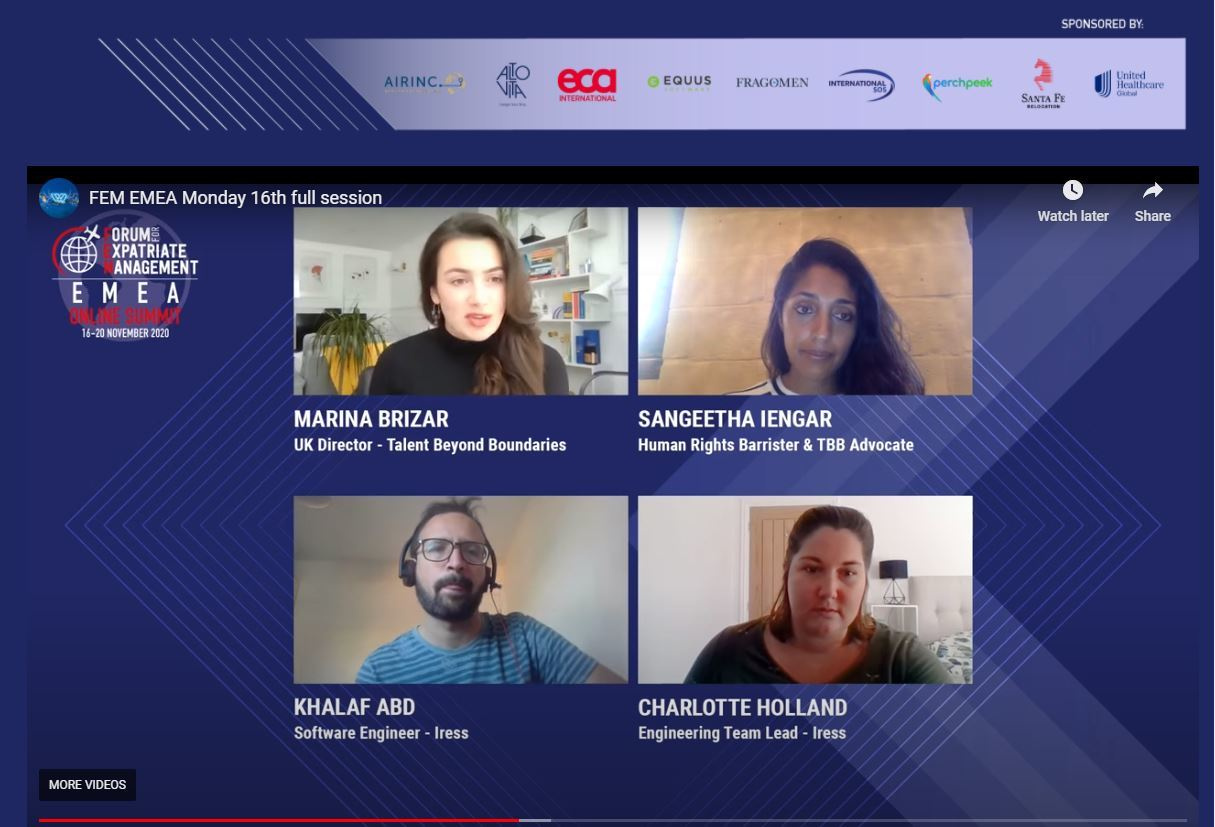Day One of FEM's EMEA Online Summit began with a keynote address given by Marina Brizar, UK Director at non-profit organisation Talent Beyond Boundaries.
Marina was joined by Sangeetha Iengar, Human Rights Barrister & TBB Advocate, Charlotte Holland, Engineering Team Lead at Iress and TBB UK's first candidate, Khalaf Abd, who is now a Software Engineer at Iress.
You can watch the video of Keynote Address: A New Resource of Global Talent? by clicking on the link here:
FEM EMEA Online Summit - Day One
We also collated the questions that attendees posted in the Chat function and Marina and Khalaf have kindly added their answers here:
Q. How are the people in your catalogue classified by the immigration authorities?
Marina:
At this stage, candidates are identified by employers as any other skilled international recruit. Displaced mobility candidates will apply for the skilled worker route (previously Tier 2 visa). In October 2020, the UK government made a commitment to exploring pathways and visa options for displaced talent mobility candidates specifically over the next 12 months. We are working closely with the Home Office on this and hopefully towards a bespoke solution.
Q. How do you identify their skills and establish employment history (references etc.)
Marina:
Skills and employment history are self-reported on registration to the Talent Catalog. For those candidates who progress to a formal intake after they are identified for a role by an employer, we have found that some candidates have verifiable documents including testamurs, transcripts and employment references. For those whose documents are not available or not accessible, skills and experience are demonstrated through the recruitment process including through interviews, technical tests and work samples, portfolios, photos or videos (where applicable).
Q. Do companies have to sponsor whole families?
Marina:
Yes, companies have to sponsor whole families. We have a firm policy on keeping family units together in mobility. If cost is an issue, employers and candidates may negotiate an agreement to recover costs for family visas and mobility once displaced talent candidates arrive in the UK and are in paid employment (for example, through a clawback over time, or salary-sacrifice arrangement).
Q. Which organisations have you worked with and have you had repeat business from them?
Marina:
The global companies we have worked with include Iress, Accenture, EY and Deloitte. In the UK we are working with the Department of Health and Social Care and NHS Employers on a displaced talent mobility healthcare program. In Australia and Canada, we have also worked with a number of SMEs from food production companies in regional towns, to nursing and care homes across the countries.
According to a global evaluation of our program in 2020, 59% of employers surveyed said they are either extremely or very likely to recruit again through TBB in future, and 35% were somewhat likely to recruit again. 93% of employers surveyed said they were either “extremely likely” or “very likely” to recommend TBB’s program to other employers, with only 7% saying they were “somewhat likely” and no employers responded that they wouldn’t recommend the program (see: https://www.talentbeyondboundaries.org/s/TBB-Global-Evaluation-2020-Final-external.pdf)
Q. Which countries does TBB operate in?
Marina:
At this stage, our "destination" countries are the UK, Australia and Canada. Our "source" countries are Lebanon and Jordan. But we are looking to scale and expand operations, particularly into the EU.
Q. Love the marriage between migration and mobility. How can we take a bigger lead to support?
Marina:
The first step would be to visit our website for information on our program, especially the Talent Catalog. You might also be interested in the videos and resources which give both short overviews and in-depth evaluations of our mission and impact.
The second step would be to get in touch with TBB UK Director, Marina Brizar (mbrizar@talentbeyondboundaries.org) to discuss how displaced talent mobility could both help you fill skills shortages and lift people out of displaced by leveraging their own professional skills.
Q. Was the process difficult for Iress –how long did it take?
Iress treated Khalaf’s application much like any other international recruitment albeit it added flexibility and support, especially on arrival to the UK. The remote recruitment process (including interview and testing) took approximately 1 month, and once the visa was lodged, the processing time was approximately 3 weeks.
Q. For Khalaf – What would have helped you to settle into the UK more easily?
Khalaf:
The process of moving to the UK and settling in was very well handled by Iress and TBB. I felt supported all the way. I worked with immigration lawyers at Bates Wells for my visa. I worked with the Facilities Team at Iress for my accommodation. My colleagues were very supportive and helped me with things like finding a dentist and a doctor. The Syrian community in Cheltenham were also welcoming and helpful. I don’t think anything could have been done better or made easier. I wasn’t very confident with my English at first so people were patient with me but I have improved a lot. Now, my family and I are building a new life in the UK.
Many thanks again to Marina, Sangeetha, Charlotte and Khalaf - and to Talent Beyond Boundaries. Contact TBB at https://www.talentbeyondboundaries.org/
You can access all 5 days of the recorded sessions and watch them at a time that suits you by clicking on the link here:
FEM EMEA Online Summit Catch-up
Keep sending in your questions and comments!
Take a look at the full week's agenda here
Meet the speakers here
Many thanks to all our sponsors: 








Please sign in or register for FREE
If you are a registered user on The Forum for Expatriate Management, please sign in